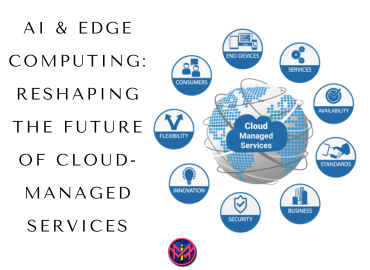


The cloud computing landscape is a dynamic ecosystem, constantly evolving to meet the ever-changing needs of businesses. Cloud-Managed Services (CMS) have emerged as a pivotal force, providing businesses with a streamlined and efficient way to manage their cloud infrastructure. But the story doesn't end there. As technology continues to advance, exciting new trends are shaping the future of CMS, promising even greater levels of automation, agility, and scalability for cloud deployments.
In this blog, we'll delve into two of the most intriguing trends that will redefine the future of CMS:
The Rise of AIops and its Integration with CMS: Artificial intelligence (AI) is rapidly transforming various industries, and IT operations (Ops) are no exception. AI for IT operations, or AIOps, utilizes machine learning algorithms to automate tasks, identify anomalies, and optimize resource utilization. Integrating AIOps with CMS creates a powerful combination poised to revolutionize cloud management.
Here are some key benefits of AIops integrated with CMS:
Automated Anomaly Detection: AIOps can continuously analyze cloud resource activity, proactively identifying potential issues like performance bottlenecks or security threats. This allows for swift intervention and prevents problems from disrupting operations.
Self-Healing IT Infrastructure: Imagine a system that can not only identify problems but also take corrective actions. Advanced AIOps integrated with CMS can achieve this by automatically scaling resources, rerouting traffic, or initiating recovery procedures in case of outages.
Predictive Maintenance: Leveraging historical data and real-time insights, AIOps can predict potential equipment failures or performance issues. This enables preventative maintenance, reducing downtime and ensuring optimal cloud performance.
Workload Optimization: AIOps can analyze workload patterns and suggest resource allocation strategies for maximum efficiency. This translates to cost savings by avoiding underutilized or overprovisioned resources.
The Marriage of Edge Computing and Cloud Management: Edge computing brings processing power and data storage closer to the source of data, enabling faster response times and reduced latency. This is particularly beneficial for applications that require real-time data processing, such as Internet of Things (IoT) deployments or autonomous vehicles. Integrating edge computing with CMS opens new doors for efficient cloud management:
Unified Management of Distributed Resources: CMS can be extended to manage both cloud and edge resources, providing a centralized platform for monitoring, provisioning, and updating all aspects of your IT infrastructure.
Improved Data Management: By processing and filtering data at the edge, CMS can help reduce the amount of data transferred to the cloud, optimizing bandwidth usage and minimizing storage costs.
Enhanced Security: Processing sensitive data closer to its source can improve security by reducing the attack surface and minimizing data exposure during cloud transmission.
The Convergence: A Symbiotic Future
The integration of AIOps and edge computing with CMS is not just a collection of separate trends; it represents a synergistic convergence. AIops can leverage the real-time data insights from edge computing to make even more informed decisions for cloud management. Conversely, edge computing can benefit from the scalability and centralized control offered by a robust CMS platform.
This convergence will usher in a future of self-aware, self-optimizing cloud environments. Imagine a cloud that not only reacts to issues but anticipates them, automatically adjusting resources and deploying solutions before problems even arise. This is the future that the integration of these trends promises for CMS and cloud management as a whole.
Beyond the Horizon: Additional Considerations
While these trends are exciting, it's important to acknowledge some potential challenges:
Security Concerns: As AI and edge computing become more prominent, the security landscape needs to evolve to address new vulnerabilities. Robust security protocols and ongoing vigilance will be crucial.
The Human Factor: While automation is beneficial, human expertise remains vital. Businesses must find the right balance between AI-powered automation and human oversight to ensure responsible and effective cloud management.
Data Privacy Regulations: With data processing happening at the edge, businesses need to ensure compliance with relevant data privacy regulations across different geographical locations.
Conclusion: Embracing the Future of CMS
The future of CMS is brimming with possibilities. As AIops and edge computing become integral components of cloud management, we can expect a paradigm shift towards self-aware, self-optimizing cloud environments. Businesses that embrace these emerging trends will gain a competitive edge, experiencing improved operational efficiency, enhanced security, and a more agile and adaptable cloud infrastructure. By staying informed and adapting their strategies, businesses can leverage the power of CMS to navigate the ever-evolving cloud landscape with confidence.